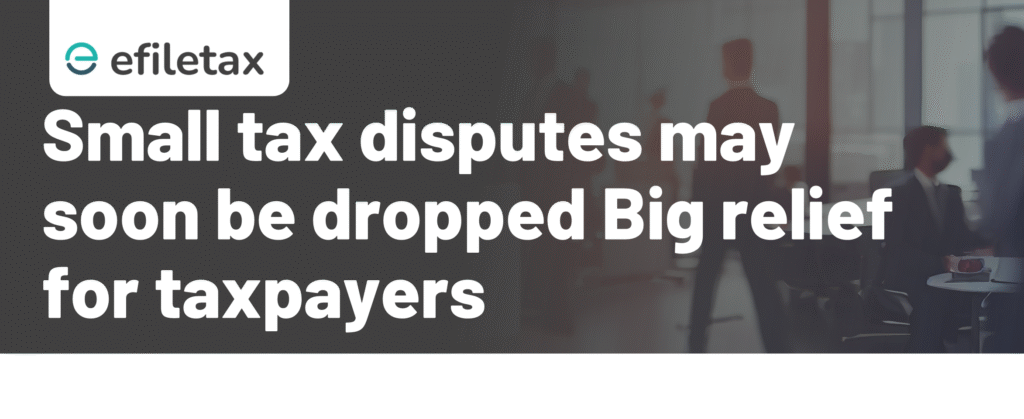
Relief Alert: Low-Value Income Tax Cases to Be Dropped Soon
The low-value income tax cases pending at various appeal levels are likely to be withdrawn soon. The Central Board of Direct Taxes (CBDT) is planning a one-time relief scheme targeting small taxpayers entangled in long-pending litigation. This move aligns with earlier policy efforts to reduce tax disputes and ease the burden on the judiciary.
If implemented, the scheme may lead to withdrawal of departmental appeals where the tax demand is below ₹25 lakh—bringing long-awaited closure to lakhs of cases.
What Are Low-Value Tax Cases?
CBDT generally classifies appeals based on monetary limits for filing cases:
| Appellate Forum | Current Monetary Threshold (as per Circular No. 17/2019) |
|---|---|
| ITAT (Income Tax Appellate Tribunal) | ₹50 lakh |
| High Court | ₹1 crore |
| Supreme Court | ₹2 crore |
But many older cases filed before this circular remain stuck in litigation. The proposed scheme focuses on these pre-2019 appeals, especially where demand is below ₹25 lakh, and aims to withdraw or settle them proactively.
Key Benefits of the Proposal
- ✅ Reduced litigation burden on small taxpayers
- ✅ Faster disposal of legacy cases
- ✅ Clarity for businesses and professionals
- ✅ De-clogging of appellate forums and better case management for the Department
Expert Insight: Why This Matters Now
According to leading tax experts, a large number of departmental appeals filed before Circular 17/2019 still remain unresolved. With faceless appeals and faster assessments in place now, clearing legacy baggage becomes essential.
“This move will benefit honest taxpayers and free up judicial bandwidth. The next phase of tax reform must focus on trust-based systems,” says CA Deepak R., a litigation consultant in Chennai.
Legal Background and Precedent
The CBDT has issued various circulars on litigation management:
- Circular No. 3/2018 – set earlier monetary limits
- Circular No. 17/2019 – revised thresholds significantly
- Circular No. 21/2023 – relaxed norms for DRP and penalty cases
However, these applied prospectively. The new proposal—expected via fresh notification or budget announcement—seeks to resolve pre-2019 cases still pending.
What Taxpayers Should Do
Here’s a quick checklist if you have a pending appeal with tax demand < ₹25 lakh:
- ✔️ Check appeal stage (ITAT, HC, or SC)
- ✔️ Review notice or appeal filing date
- ✔️ Track CBDT announcement on the new withdrawal scheme
- ✔️ Consult your tax consultant to prepare for case closure
If eligible, you may not need to take any action—CBDT is expected to withdraw the appeal suo motu.
Similar Past Relief Schemes
| Scheme | Year | Coverage | Relief Offered |
|---|---|---|---|
| Vivad se Vishwas | 2020 | Disputed tax/litigation | Full/partial interest & penalty waiver |
| Amnesty for Small Cases | Expected 2025 | Low-value pre-2019 appeals | Likely withdrawal of department appeal |
Final Word
This move is another step in India’s ongoing effort to build trust-based tax administration. By cutting off legacy disputes under ₹25 lakh, the CBDT can signal strong intent toward easing compliance and improving taxpayer morale.
Need help checking if your case qualifies?
Let Efiletax help you assess eligibility and navigate any compliance documentation.
FAQ on Low-Value Tax Appeal Withdrawal
Q1. Will this apply to cases filed by the taxpayer?
No, the expected withdrawal is only for departmental appeals, not taxpayer-initiated ones.
Q2. Do I need to file any form to opt in?
As per earlier practice, if the CBDT withdraws its appeal, no action is required from the taxpayer.
Q3. What if my case is for penalty only?
CBDT may include penalty-only cases in the withdrawal list, based on past circulars.
Q4. Is interest and penalty also waived?
This depends on the upcoming circular. Past schemes like Vivad se Vishwas offered such relief.
Summary:
Low-value income tax cases may soon be withdrawn by CBDT if tax demand is below ₹25 lakh. The proposal aims to reduce legacy disputes and ease taxpayer burden.